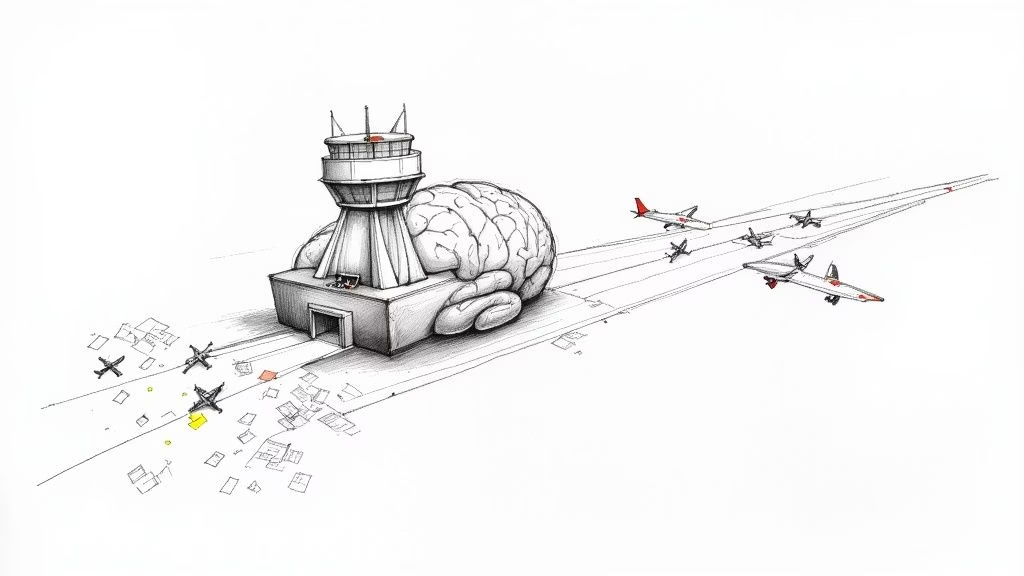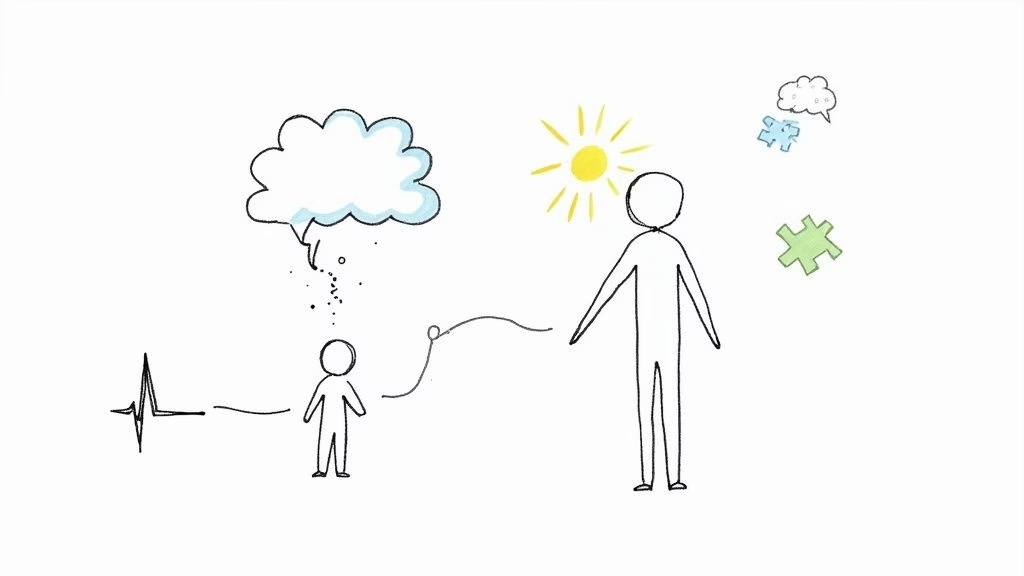Think of executive functioning as the CEO of your brain. It's the set of high-level mental skills that act as your personal command center, helping you plan, focus, remember what you just read, and juggle multiple things at once. These skills are absolutely crucial for navigating life, especially during the demanding teen and young adult years.
The CEO of Your Brain
Imagine trying to build a complex Lego set without the instructions, a plan, or any way to sort the pieces. It would be a chaotic, frustrating mess, right? Executive functioning skills are the mental toolkit that prevents that chaos. They allow you to organize your thoughts and actions so you can actually achieve your goals.
This becomes a huge deal for teens as schoolwork gets tougher, social pressures mount, and the need for independence grows. Essentially, these cognitive processes are what allow you to plan, hold your focus, remember directions, and manage everything on your plate.
When these skills aren't fully developed, it can feel like you're constantly fighting an uphill battle. Everyday tasks can feel overwhelming, and it's often linked to conditions like ADHD. You can learn more about the specific challenges by exploring the signs of executive dysfunction.
The Three Core Pillars of Executive Functioning
Executive functioning isn't just one single skill. It's more like a team of three core abilities working together in harmony. To really get a handle on it, you need to understand each player on the team.
Let's break them down into the three primary components.
| Core Skill | What It Means | Example for a Teen |
|---|---|---|
| Working Memory | This is your brain's temporary sticky note. It's the ability to hold and use information in your mind for a short time to complete a task. | Remembering the steps to solve a multi-part math problem while you're working through it, without having to look back at the instructions every two seconds. |
| Cognitive Flexibility | Think of this as your brain's ability to pivot. It lets you switch gears and adapt when things change or a plan falls apart. | Your study group cancels at the last minute. Instead of giving up, you quickly create a new plan to study on your own and decide which topics to prioritize. |
| Inhibitory Control | This is your self-control muscle. It helps you manage your attention, behavior, and emotions by overriding impulses and distractions. | Resisting the urge to check your phone notifications and scroll through TikTok when you know you need to finish your history essay. |
These three pillars are the foundation for all the higher-level skills we need to get things done.
This diagram shows how these three core skills build upon each other to create the more advanced executive functions we use every day, like planning and problem-solving.
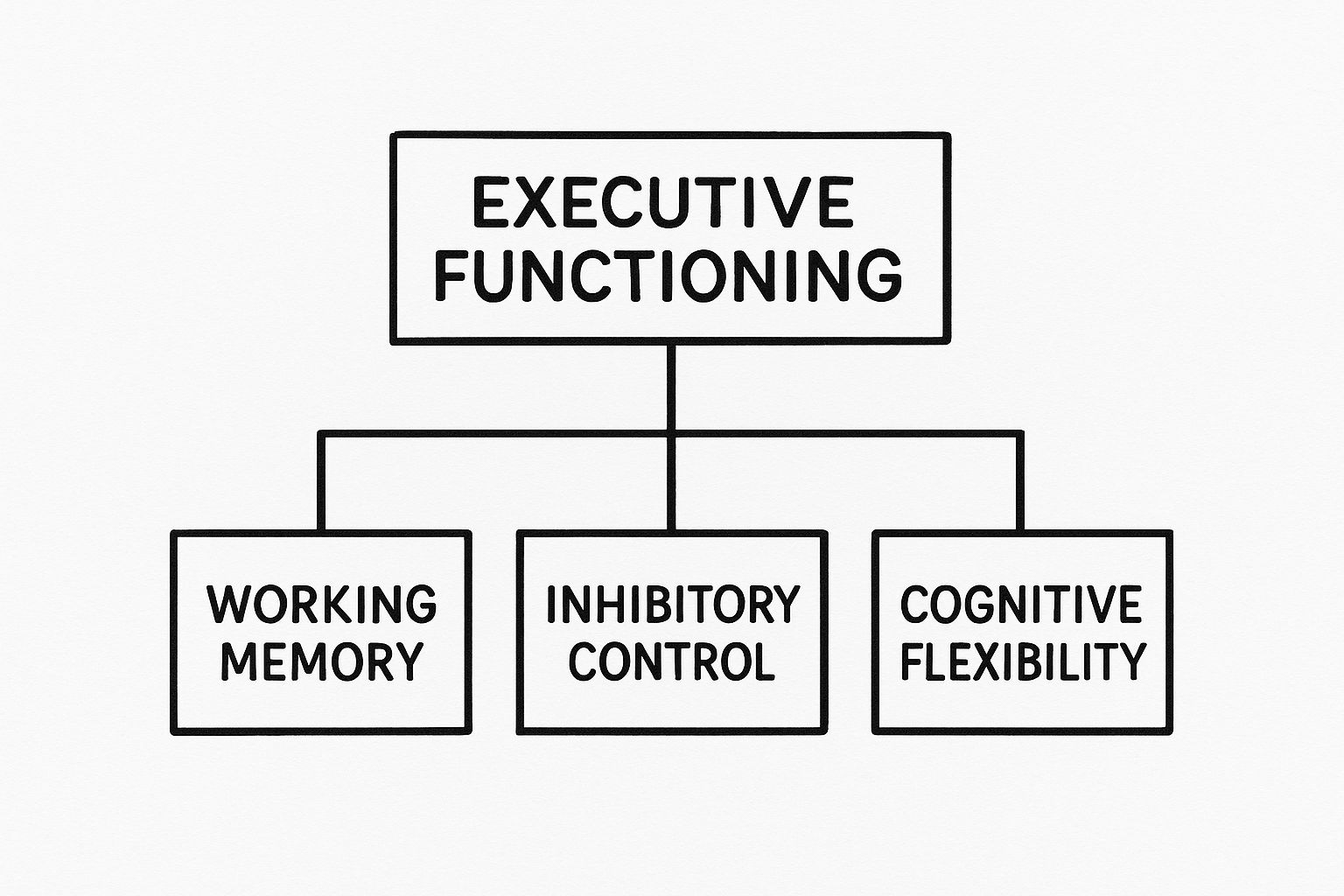
As you can see, they're distinct skills, but they're also deeply interconnected. They work together to manage your ability to self-regulate and move toward your goals, whether that's finishing homework, saving money for a car, or just getting through a busy week.
Recognizing Executive Functioning Struggles in Daily Life
Does a messy backpack overflowing with crumpled papers sound familiar? How about procrastinating on a big project until the last minute, or that sinking feeling when you realize you missed a deadline?
These aren't just personality quirks or signs of being lazy. More often than not, they’re the everyday signals of executive functioning challenges. These are the skills that bridge the gap between intending to do something and actually doing it. When that bridge is weak, life can feel frustrating and overwhelming.
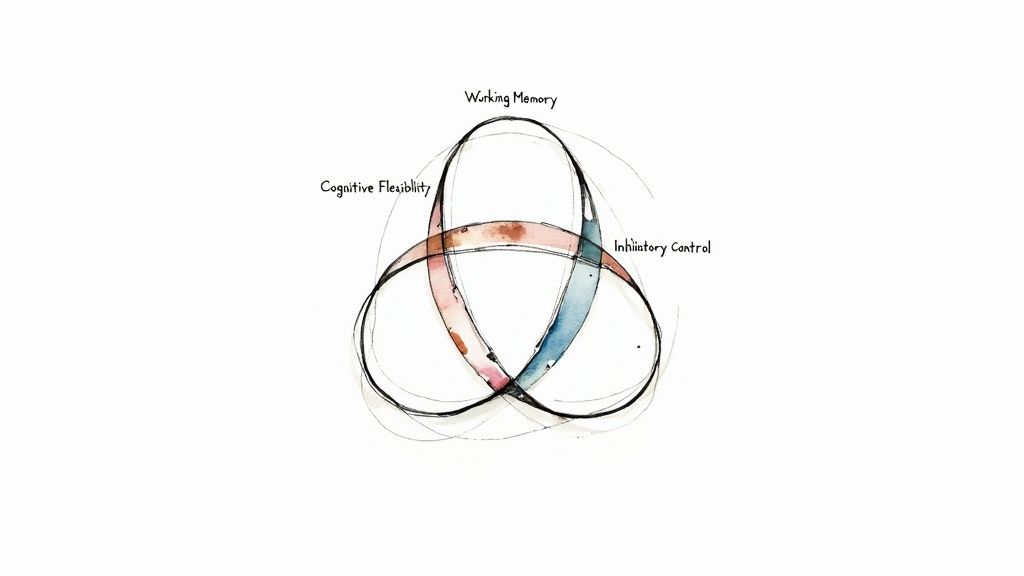
It’s the internal battle to just start an essay, even when you know exactly what you want to write. It’s the endless cycle of forgetting homework, losing your keys, or struggling to keep your cool over a small setback. These moments are more than just annoying; they point to specific skill gaps that can impact everything from grades to friendships.
Common Signs in School and at Home
For teens and young adults, these struggles often show up most clearly at school and at home. The demands for self-management and organization ramp up fast, and any weaknesses in executive skills suddenly become glaring.
Procrastination isn't just about avoiding work—it’s often a sign of difficulty with task initiation, which is the mental hurdle of simply getting started. A messy room or backpack isn't just clutter; it points to challenges with organization and planning.
And these aren't small issues. Research from organizations like the Center on the Developing Child at Harvard University shows that struggles with executive function can have a real, lasting impact on a person's life and future success.
Parenting Tip: Try reframing the conversation. Instead of asking, "Why haven't you started your homework yet?" shift your approach. Try, "It looks like getting started is tough right now. What's the very first, smallest step we can figure out together?" This turns the focus from blame to collaborative problem-solving.
Beyond Academics: Mental Health and Motivation
Executive functioning is also deeply tied to mental health. That constant feeling of being behind or failing to meet expectations can fuel anxiety and crush self-esteem. When you struggle to regulate your emotions, a minor frustration can quickly spiral into a major meltdown, putting a strain on your relationships.
For teen boys and young men, societal pressure to "have it all together" can make it even harder to talk about these kinds of struggles. It's crucial to have supportive communities and resources where it's safe to build emotional intelligence and coping skills. Organizations like The Jed Foundation and Active Minds provide valuable mental health resources tailored for teens, offering research-backed information and support networks.
Sometimes, these challenges can show up in very specific ways. For instance, it's important to recognize the signs of phone call anxiety, which often requires strong executive skills to manage. Acknowledging these signs is the first step toward building stronger skills and finding the right support to move forward.
Connecting Executive Skills to Motivation and Procrastination
Have you ever stared at a blank screen, knowing you have an essay to write, but feeling physically unable to start? It’s a feeling a lot of us know well, and it's almost always mislabeled as laziness.
But here’s the truth: what looks like a lack of motivation or a nasty procrastination habit is usually a sign of an executive functioning challenge.
Think of these mental skills as the engine that powers you to take action. When that engine is sputtering, the whole process of getting work done can feel like trying to climb a mountain in flip-flops. A weak working memory can make a multi-step math problem feel impossible because you can't hold all the pieces in your head at once. Or, if emotional control is a struggle, you might just give up the second a task gets frustrating.
The Real Reason You Procrastinate
Procrastination isn’t a character flaw. It’s a skills gap.
The mental muscle required just to start something—what experts call task initiation—is a core executive skill. When this skill is underdeveloped, your brain can perceive a challenging task as a legitimate threat. This triggers a "fight or flight" response that makes you want to avoid it at all costs, especially with school work.
This kicks off a vicious cycle. You put off the task and feel a wave of temporary relief, but then the stress comes roaring back even stronger as the deadline gets closer. This cycle doesn't just feel bad; it slowly chips away at your self-esteem and reinforces the story you tell yourself: "I just can't get things done."
Parenting Tip: Shift your role from being a manager to being a coach. Instead of saying, "You need to stop procrastinating and do your work," try asking, "What's the smallest possible first step? Can we just open the book together?" This simple shift lowers the perceived threat and helps build the skill of task initiation, one small step at a time.
How to Reframe the Motivation Struggle
Here’s something most people get wrong: true motivation rarely just shows up out of thin air. It’s something you build through small wins and the growing confidence that you can actually handle what's in front of you.
When executive functioning is weak, it's incredibly difficult to build that momentum. This is a huge reason so many teens and young adults find themselves wondering, "why do I have no motivation?" If that question sounds familiar, understanding the link between your brain's skills and your drive can be a total game-changer.
This can be especially tough for teen boys and young men, who often feel the pressure to be totally self-reliant and just "figure it out." It’s vital to remember you're not alone and to find resources that offer real support. Finding men's groups or mental health resources can provide a safe space to talk about these struggles and build healthier ways to cope.
Learning how to manage your focus and emotions is one of the most direct ways to boost your motivation—and that’s where mindfulness comes in. Even a simple meditation guide for teens can offer practical tools to quiet the mental noise and build the muscle needed to take on school and life.
By understanding what executive functioning really is, you can finally start working on the root cause instead of just fighting the symptoms.
Practical Strategies to Strengthen Your Executive Skills
Knowing the "what" and "why" of executive functioning is a great start. But now, let's get into the "how." Think of building these mental skills like building muscle at the gym—it takes consistent practice with the right moves. Small, intentional actions can build massive confidence and prove you can take the driver's seat.
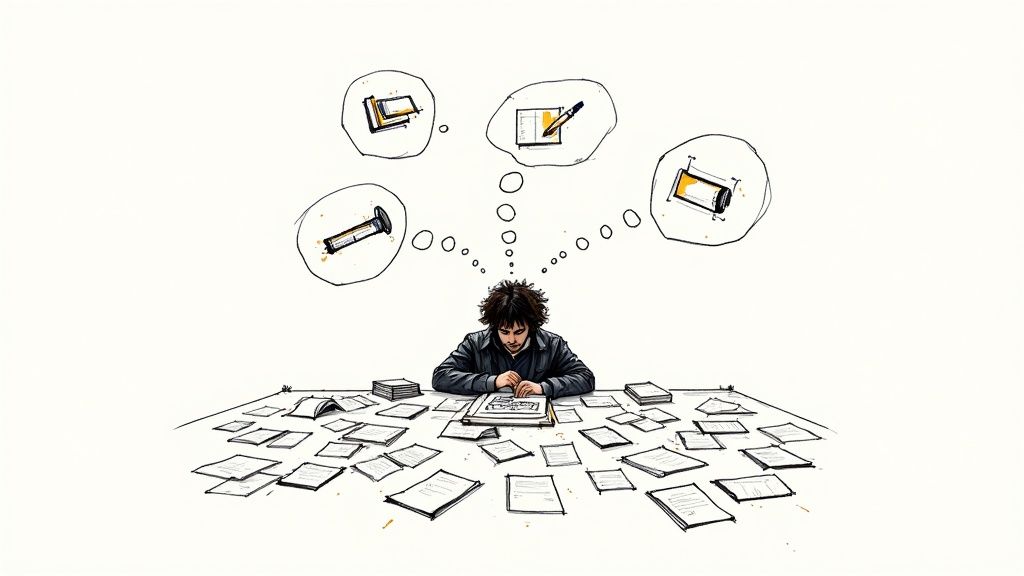
Here's a toolbox of methods that actually work for teens, with some tips for parents who want to help. The goal here isn't perfection; it's progress.
Techniques to Tackle Procrastination and Boost Focus
For a lot of teens, the biggest fight is just getting started and staying on task. Procrastination and distraction can blow up even the best plans. The trick is to use simple, structured systems that remove the mental roadblocks.
One of the best is the Pomodoro Technique. It couldn't be simpler:
- Pick one single thing to work on.
- Set a timer for 25 minutes and just go. No distractions.
- When the timer dings, you have to take a 5-minute break.
- After four of these cycles, take a longer break of 15-30 minutes.
This works because it makes the commitment feel tiny. "I can do anything for 25 minutes" is a lot easier to swallow than "I have to finish this entire history paper."
Parenting Tip: Shift from being a manager to being a coach. Instead of the dreaded, "Is your homework done yet?" try, "How about we knock out one 25-minute focus session together?" This models the habit you want to see and turns a potential argument into a team effort.
Mastering Organization and Planning
That feeling of being crushed by a huge project? That's a classic executive function struggle. The way out is to break it down into smaller, less scary pieces. It's often called "chunking."
- Use Visual Planners: A whiteboard on the wall or a digital tool like Trello makes tasks feel real and manageable. Seeing the steps laid out in front of you clears the fog.
- Create "To-Do" and "Done" Lists: There's a real power in moving a task from the "To-Do" column to the "Done" column. It gives your brain a little hit of dopamine that fuels you for the next thing.
- The 2-Minute Rule: If something takes less than two minutes, just do it now. Don't let it sit. This stops the small stuff from piling up and becoming its own source of stress.
For young adults entering the workforce, these same skills are what separate the ones who thrive from the ones who struggle. The principles apply everywhere, from managing a project at work to using proven interview preparation strategies to land the job in the first place.
Resources for Support and Mental Health
Building these skills isn't a solo mission. And for teen boys and young men, who often feel the pressure to figure it all out on their own, finding the right support is a game-changer.
Connecting with people who just get it can make all the difference. Reputable resources like The Jed Foundation and Active Minds offer incredible mental health support specifically for teens and young adults. For those looking for community, exploring local or online Men's Groups can provide a safe space to talk through challenges and build real emotional strength. These groups are all about creating a network of support, which is vital for long-term growth.
Resources for Teen Guys and Young Men
Let’s be real: it can be tough for guys to talk about their struggles. The pressure to have everything figured out is intense, especially as a teen or young adult. But here’s the truth—you’re not alone.
Understanding what executive functioning is and how to strengthen it is a huge step, but finding the right support system is just as crucial. Societal pressure often makes it hard for guys to ask for help, but there are communities out there ready to listen, without judgment.
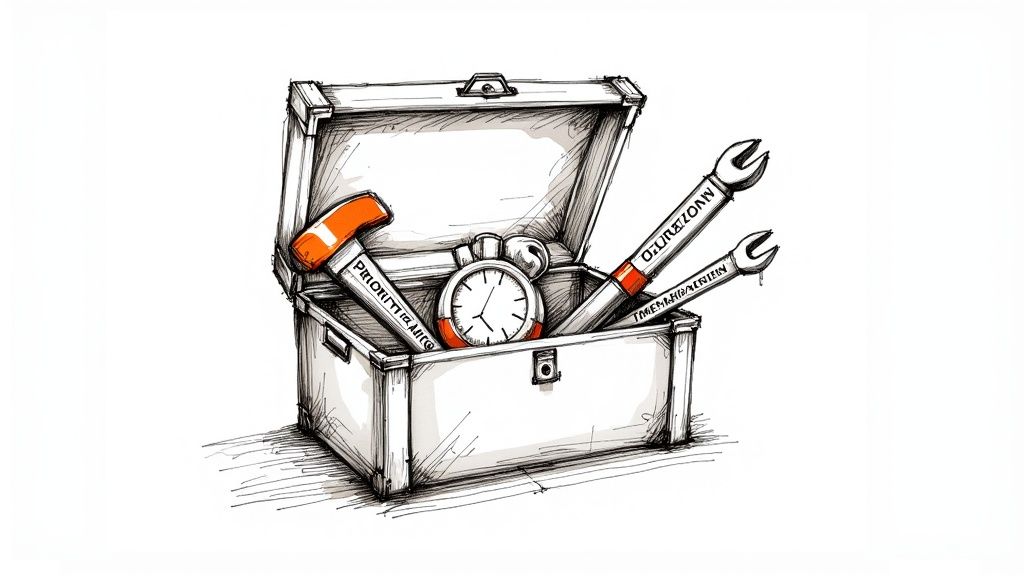
This goes way beyond just managing homework. It's about building emotional intelligence and finding healthy ways to handle stress, beat procrastination, and stay motivated. Reaching out isn’t a sign of weakness—it’s a sign of strength. It shows you’re ready to take control.
Finding Your Support System
Knowing where to turn is half the battle. Thankfully, many organizations are dedicated to creating safe spaces for young men to connect and grow. They get the unique challenges you’re up against.
- Online Mental Health Communities: Platforms like The Jed Foundation and Active Minds are packed with great resources and articles. They’re geared specifically toward teens and young adults navigating the pressures of school and life.
- Men's Groups: Whether online or in-person, these groups offer a place to connect with peers and mentors who understand what you're going through. The focus is on building healthy masculinity, better communication skills, and emotional resilience.
- A Simple Meditation Guide for Teens: Don't underestimate mindfulness. It’s a powerful tool for sharpening focus and managing your emotions. Starting with a simple meditation guide can help you build the mental muscle to stay calm and in control when things get chaotic.
Parenting Tip: Encourage, don't force. Instead of pushing your son to "talk about his feelings," create opportunities for connection through shared activities. A real conversation often happens more naturally during a walk, a drive, or while working on a project together—it feels less like an interrogation.
The Long-Term Importance of These Skills
Building up your executive function skills now will pay off for the rest of your life. It’s not just about getting through the next exam. Research actually shows that strong executive function is a massive predictor of health, success, and independence down the line.
According to research highlighted by the Center on the Developing Child at Harvard University, individuals with stronger executive function skills in childhood tend to have better physical health, more stable finances, and a higher quality of life in adulthood. That really highlights why putting in the work now is so critical.
For anyone looking for structured, one-on-one support, executive function coaching offers a personalized game plan to turn these challenges into strengths. It creates a clear path forward, helping you build the skills you need to crush it in school, college, and whatever comes next.
A Simple Meditation Guide to Improve Focus
Think of meditation as a workout for your brain's attention muscle. It’s a practical, powerful tool for strengthening executive functions like focus and emotional control, helping you navigate the constant distractions from school, social media, and just life in general.
This isn't some mystical practice; it’s a simple technique that reduces stress and gives you more control over your thoughts and actions.
The science behind it is solid, too. Research shows that mindfulness meditation can physically change the prefrontal cortex—the very part of your brain responsible for executive functioning. Even just a few minutes a day can make a huge difference in how you handle knee-jerk reactions and stay focused when things get tough.
Your 5-Minute Breathing Exercise
You can do this simple exercise anywhere, anytime you feel overwhelmed or your mind is racing. It’s a quick way to hit the reset button.
- Find a Comfortable Spot: Sit upright in a chair with your feet flat on the floor and hands resting on your lap. You can close your eyes or just lower your gaze.
- Focus on Your Breath: Take a slow, deep breath in through your nose for four counts. Feel the air fill your lungs.
- Hold It Gently: Hold that breath for just a moment. Don't strain.
- Exhale Slowly: Breathe out slowly through your mouth for six counts, letting go of any tension you're holding.
- Repeat for 5 Minutes: Continue this cycle. When your mind wanders (and trust me, it will), just gently guide your focus back to the feeling of your breath. That's the entire practice—noticing you're distracted and coming back.
This simple act of returning your focus again and again is the core of mindfulness. Each time you bring your attention back to your breath, you are doing one more "rep" for your brain's focus muscle, strengthening your inhibitory control.
Taking the Next Step
This exercise is a great starting point. As you get more comfortable, you can explore guided meditations, which can be incredibly helpful for staying on track when your mind feels extra busy.
There are some fantastic resources out there. Apps like Calm or Headspace offer guided sessions specifically for focus, stress, and sleep. And if you want to dive deeper, this detailed meditation guide for teens offers more techniques to help you build a practice that really sticks.
Got Questions? Let’s Clear Things Up.
Let’s tackle some of the most common questions that come up. Getting straight answers can help connect the dots for both teens and parents.
Are Executive Functioning Issues and ADHD the Same Thing?
Not exactly, but they are incredibly close cousins. Think of it this way: ADHD is a clinical diagnosis, and a major part of that diagnosis involves significant challenges with executive functions.
Just about everyone with ADHD is going to struggle with these skills, but not everyone who struggles with these skills has ADHD. Sometimes, issues with planning, focus, and emotional control can be tied to anxiety, depression, or even just a period of high stress.
Can These Skills Actually Get Better?
Absolutely. The brain is remarkably flexible, especially during the teenage and young adult years. While some people might be naturally better at these things, these skills aren't set in stone. They can be built and strengthened with the right strategies and consistent practice.
A Quick Tip for Parents: Make a point to praise the effort, not just the final grade. If you see your teen using a planner without a reminder or starting their homework on their own, acknowledge it. That small moment of positive feedback builds their confidence and proves their hard work is making a difference, which encourages them to keep going.
When Should We Look for Professional Help?
It’s time to bring in a professional when these challenges are causing real, ongoing problems in major parts of life—school, friendships, or family relationships.
If your teen is consistently failing classes even though they’re trying, having intense emotional outbursts, or feeling so overwhelmed it’s leading to serious anxiety, it’s a sign to get support. A professional can help figure out what’s really going on and build a plan that actually helps.
Struggling with motivation, planning, or just feeling stuck can be isolating, but it’s not a battle you have to fight alone. Andrew Petrillo Life Coaching offers one-on-one support to help teens and young adults build the real-world skills they need to find their direction and build confidence. If you’re ready to turn those challenges into strengths, book a complimentary discovery call today.

















